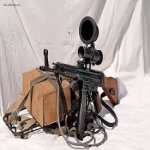AP, you and I can agree that the blitz was a war crime. Bombing civilians in an effort to crush their morale was Douhet's idea and was proven, both by the blitz and the best efforts of Bomber Command, to be a fiction. You can kill and dehouse and maim an awful lot of civilians before it has any real effect on the war. In fact, it seems to agitate them to no end. Makes 'em WANT to fight, to come to YOUR nation and bomb the sh!t out of you. Pretty basic human stuff. The "Oh yeah? Well, take THIS" reflex.
I'm not forgetting or negating the crimes of Fat Hermann's lads over England. It was swinish to bomb civialians, and once proven ineffective, it should have, had logic been in play, been stopped. If we agree that killing children in their homes is wrong, then it's wrong all around, isn't it?
Morality aside, one wonders if Bomber Command couldn't have refocussed their efforts on more effective methods of fighting the war. They had a few better options after January '44. The night area bombing of cities was doing nothing to reduce war production. In fact, it increased. The Yanks were having a real effect on the war effort by bombing fuel production faciities. By the Spring of '45, the Germans had planes, but no fuel for them and no fuel to train pilots. THAT made a difference. Levelling cities didn't.
I hold the aircrewmen of Bomber Command in very high regard indeed. Their losses were the worst of any arm of any force in the war exceot the U-boat sailors. They operated at night, likely scared most of the time, and with a minimal chance of completing a tour. The guts it would have taken to climb in the back door of a Lanc night after night - I don't believe I could have done it. But I believe these young men were misused. I think, for the losses they suffered, they could have made a greater difference and ended the war sooner than they did had Harris not been driving the boat.











































































